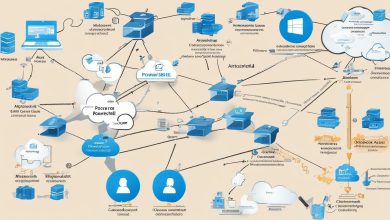As businesses continue to scale and evolve, more and more are turning to microservices architecture to handle the demands of modern software development. However, managing and organizing these microservices can prove challenging without the right tools and strategies. That’s where Azure API Management comes in.
Azure API Management is a powerful tool that can help streamline the management and organization of your microservices architecture, leading to increased efficiency and scalability. By effectively orchestrating your .NET Core microservices through Azure API Management, you can simplify the process of managing your APIs and ensure they are working seamlessly together.
Key Takeaways:
- Azure API Management is a powerful tool for orchestrating .NET Core microservices.
- API orchestration is essential for streamlining the management and organization of microservices architecture.
- Utilizing Azure API Management can lead to increased efficiency and scalability in your microservices ecosystem.
Understanding Azure API Management
If you’re working with microservices architecture, API Management is an essential tool to ensure smooth communication and scalability within your ecosystem. Azure API Management, powered by Microsoft Azure, is a robust API management platform that can help you achieve this goal.
API Management is designed to handle the complexity of managing APIs, protecting them with security, and ensuring that they operate without fail. With Azure API Management, you can manage all your APIs from one place, apply policies, and ensure secure access to APIs from authorized parties.
One of the benefits of using Azure API Management is that it provides an easy-to-use user interface for managing your APIs. The platform offers a range of features, including API gateway, developer portal, and analytics, which can help you orchestrate your APIs more efficiently.
Furthermore, Azure API Management is fully integrated with Microsoft Azure, providing seamless integration with other Azure services such as Azure Functions, Azure App Service, and more. This feature makes it easier for developers to build and manage microservices using .NET Core and other frameworks.
Overall, Azure API Management is a powerful API orchestration tool that can simplify the management of APIs, boost scalability, and enable you to focus on developing robust and efficient .NET Core microservices.
Building .NET Core Microservices
Developing .NET Core microservices is an essential part of implementing an efficient microservices architecture. By creating modular, independent services, you can easily scale and maintain your software systems. When building .NET Core microservices, it’s important to keep the following guidelines in mind:
- Break down your system into smaller, independent services that can be developed and deployed separately.
- Use a single programming language, such as C#, to ensure consistency and compatibility between your microservices.
- Design your microservices with a clear purpose in mind and have well-defined interfaces to communicate with other services.
- Ensure that your microservices are loosely coupled and can be developed, deployed, and scaled independently.
When building .NET Core microservices, it’s also important to make sure they are compatible with API management tools, such as Azure API Management. This includes adhering to common design patterns and implementing necessary security measures, such as authentication and authorization.
By following these best practices, you can create a robust .NET Core microservices architecture that can be easily managed and orchestrated with Azure API Management.
Orchestrating Microservices with Azure API Management
API orchestration is essential for managing complex microservices architecture. Azure API Management provides a comprehensive solution for API orchestration with its powerful features and tools. In this section, we will explore how to use Azure API Management for orchestrating your .NET Core microservices.
API Gateways
API gateways are a critical component of API orchestration. They provide a single point of entry for client requests and delegate them to the appropriate microservices. Azure API Management allows you to create and manage API gateways with ease. You can define routing rules, transform requests and responses, and implement caching for improved performance.
Policies
Policies are a set of rules that govern the behavior of your APIs. Azure API Management provides an extensive policy framework that enables you to define policies for authentication, authorization, rate limiting, and more. You can also create custom policies to cater to your specific requirements.
Securing your APIs
Securing your APIs is critical for protecting your microservices architecture from unauthorized access and attacks. Azure API Management provides a range of security features, including OAuth 2.0 authentication, IP filtering, and encryption. You can also integrate Azure Active Directory for enterprise-level security.
Monitoring and Analytics
Monitoring and analytics are essential for maintaining the health and performance of your microservices architecture. Azure API Management provides comprehensive monitoring and analytics capabilities, enabling you to track API usage, identify performance bottlenecks, and troubleshoot issues. You can also integrate with Azure Monitor for advanced monitoring and alerting.
Benefits of Azure API Management
Azure API Management offers numerous benefits for orchestrating your .NET Core microservices. It provides a unified platform for managing and organizing your APIs, making it easier to scale and maintain your microservices architecture. You can also leverage its security features to protect your APIs from malicious attacks and ensure compliance with industry standards. With Azure API Management, you can unlock the full potential of your microservices architecture.
Conclusion
Overall, the use of Azure API Management in orchestrating your .NET Core microservices is an essential tool for achieving greater efficiency and scalability in your architecture. By following the guidelines and best practices outlined in this guide, you can unlock the full potential of your microservices ecosystem.
With Azure API Management, you can easily manage and organize your APIs, secure and monitor your services, and streamline the development process. By utilizing the features and benefits of this powerful tool, you can optimize your microservices architecture and achieve greater success in your business.
Takeaways
Remember to:
- Understand the role that Azure API Management plays in facilitating API orchestration
- Build .NET Core microservices that are compatible with API management tools
- Orchestrate your microservices with Azure API Management, including using API gateways and policies to secure and monitor your APIs
- Implement the best practices and guidelines outlined in this guide to unlock greater efficiency and scalability in your microservices ecosystem
By utilizing the power of Azure API Management, you can leverage the full potential of your .NET Core microservices architecture. So start exploring this powerful tool today and stay ahead of the competition!
FAQ
Q: What is Azure API Management?
A: Azure API Management is a powerful tool that allows you to manage and organize your APIs in a streamlined manner. It provides features such as API gateways, policies, and monitoring capabilities, making it easier to orchestrate your .NET Core microservices.
Q: Why should I use Azure API Management to orchestrate my .NET Core microservices?
A: Azure API Management offers numerous benefits for managing your microservices architecture. It helps in centralizing the management of your APIs, securing and monitoring them, and provides scalability and flexibility for your architecture.
Q: How does Azure API Management fit into my microservices architecture?
A: Azure API Management acts as a central hub for your APIs, allowing you to manage them efficiently. It acts as an API gateway, controls access to your APIs, and enables you to apply policies and monitor usage.
Q: How can I build .NET Core microservices?
A: Building .NET Core microservices involves creating modular and lightweight services using the .NET Core framework. You can follow best practices, such as designing microservices with single responsibilities and using lightweight communication protocols like HTTP/REST.
Q: What are the advantages of using Azure API Management for microservices orchestration?
A: Azure API Management offers several advantages for orchestrating your microservices. It provides a centralized management platform, ensures security and scalability, allows for efficient monitoring and analytics, and simplifies the integration and management of APIs.








